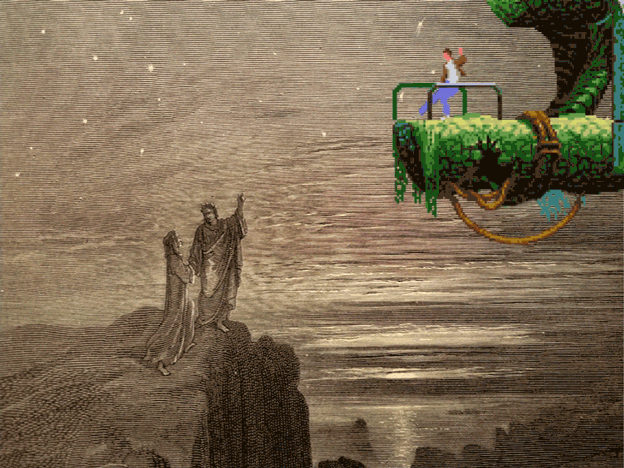Bright arrogance #7
Death Metal Dante

“Hell is other people,” and that’s perhaps why Dante chose to write in the vernacular. Mary Jo Bang posits Dante’s choice of demotic Italian over more academic Latin as crucial to her more “pop” approach to the Inferno, as if Dante, in descending the circles of Hell, were literally playing out a necessary descent from the purities of high-culture into the noisy substrata of the low.[1] But for a misreading of Benjamin, in which Bang posits his translational ethics as invested in “sharing what is common to all,” her approach partakes in Benjamin’s notion that, in the zombie “afterlife” of a text, one can only reanimate it through translation in ways that are impermanent and historical. Like Dante’s dead, which raise themselves from the various mucks and murks of nothingness in order to momentarily tell their story, the translation “rises into a higher and purer linguistic air,” in order apprise us of its foreignness, before falling back into the common.
So intently does Bang play out the notion of translation’s impermanence, that many of her footnotes seem intended as time-capsules, with Googly definitions of things like “cocktail party,” “heat-seeking missile,” “pyramid scheme,” and “death metal” mixed with more obscure data about feuds between Guelphs and Ghibellines in 14th-century Italy. Sometimes she even attaches literary information to fairly generic phrases. If Virgil happens to say “That’s all you need to know” in an off-handed way, it is pointedly not a reference to Keats’ “that is all/ Ye need know on earth, and all ye need to know,” though Bang makes it so. In this, she is perhaps creating a parody of the footnote, playing out Nabokov’s translational ideal of “translations with copious footnotes, footnotes reaching up like skyscrapers to the top of this or that page so as to leave only the gleam of one textual line between commentary and eternity.” She is also announcing that her work is a patchwork, filled with echoes of diverse texts and announcing an affiliation of her translation with more conceptual appropriative practices and remix art.
This influence—traversing the avant-garde of “uncreative writing” and more “folk” culture jamming practices—has a prominent place in the origins of this translation of seemingly more tony aspirations. Bang, in her introduction, points out that she was inspired by Caroline Bergvall’s Via, a conceptual work that replays the Inferno’s first tercet over and over again, with variations; these are appropriated openings, various attempts at English mouths mouthing the mouth of hell, transcribed from the translations she was able to find in the British Library. The effect, perhaps, is as if Dante, instead of moving forward from his initial silvan bewilderment, was afflicted by cosmopsis—the fictional disease from John Barth’s The End of the Road, in which the protagonist, when faced with proliferating existential choices, can only do nothing. And even though Barth puts this experience at the road’s “end,” it is probably the most apt translation of the experience of “nel mezzo”—the first words of the poem and the locus communis of experimental translation.
While it’s remarkable that Bang credits Bergvall’s conceptual piece as inspiring her entire project, there is a Flarfy swagger to her poem that—amidst all the shout-outs—goes uncredited. I would go as far to say that the more brut aesthetic of Flarf—the brand of conceptual writing that doggedly (even three-headed doggedly) takes on the vernacular dreck of the web—haunts this version of the Inferno. We’ll talk in the next column about the limits of ugly, and where to draw the line, literally, between the Inferno’s cosmic horror and more beaux-art charms, but suffice to say one can speculate that there exists at least one canto of Bang’s translation, now unavailable, that was pure Flarf. Her use of the word “corrosive,” often used in conjunction with Flarf, is key here: “I tried to stay scrupulously true to the narrative, . . . but wrote as if I were some cyborgian hybrid. . . . at times I adopted a comic sensibility, a parodic silliness I would eventually decide was corrosive to the text. I would later radically revise this canto.”
Must one place this distance between the translation and its corrosive alter-ego to prevent one’s own dissolution into the dark woulds of translation? If translation, according to Emily Apter, is “the language of planets and monsters,” how is the translator translated in it?
~NEXT WEEK: DANTE AND EXPANDED TRANSLATION!~
1. However, it’s important to note that Dante’s populism is most times overstated. As Umberto Eco points out, Dante’s De Vulgari Eloquentia proposes an “illustrious vernacular” culled from the best poetic texts in Italian, rather than from the vast and varied dialects as actually spoken. Like the authors of the Gaelic Auracepti na n-Éces, he sought to reconstruct a modern analogue of the Adamic tongue from a patchwork of luminous texts, seeking “authorities” and authorization outside of the language of empire. As later would Jacques Rancière, he perhaps realized that the “common” could subsume the poetic, even if it had to be the ultimate source of poetic language. See Serendipities, pp. 23-51.
Bright arrogance